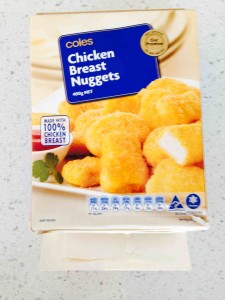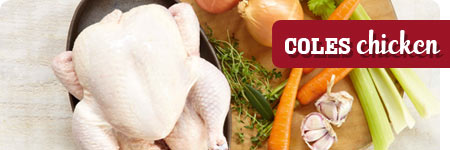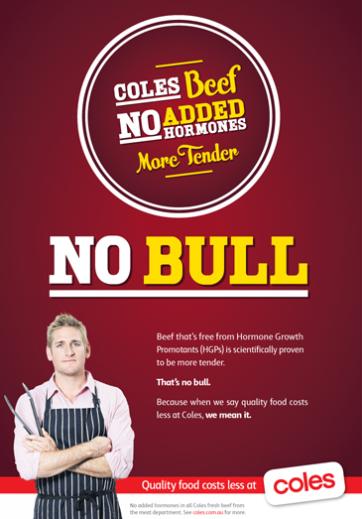“Doug, I may have sickened Sorenne.”
That’s what Amy told me after serving the kid some chicken nuggets from Coles, one-half of the supermarket duopoly in Australia.
Normally I cook and temp a full chicken and we eat the leftover bits in various meals. But today’s kids, they go for the chicken nuggets so we have some on hand when we’re tired,  lazy or indifferent.
lazy or indifferent.
Whether frozen chicken thingies are pre-cooked or raw has been an on-going issue in the U.S and our household since 2007.That’s when we first came up with the experiment described in the abstract below.
Raw, frozen not-ready-to-eat entrees purchased in retail and prepared in the home have been identified as a significant risk factor for salmonellosis. From 1998 to 2008, eight separate outbreaks have implicated undercooked chicken nuggets, chicken strips, and stuffed chicken entrees. In each outbreak, affected individuals prepared entrées in a microwave oven, did not follow recommended cooking instructions, and failed to take the internal temperature of the cooked product. A survey of U.S. grocery stores in 2008 revealed manufacturers fail to provide consumers clear and concise preparation instructions.
Amy recooked the chicken thingies and ensured safety with a tip-sensitive digital thermometer.
I looked at the box (right, exactly as shown) and there was no indication whether the nuggets were cooked to a safe temp and then frozen, or frozen raw.
So I called Coles customer service Friday afternoon; that is why there is a customer service number on the box.
The woman was courteous, left me on hold for a few minutes, and had no clue about my question and couldn’t find the information
She said with the long weekend and all, they’d probably back to me Tuesday.
It’s Tuesday afternoon here – nothing.
Maybe Coles’ general manager, Jackie Healing, who will represent Australia at the Global Food Safety Conference in the U.S. next month can answer. Maybe someone there can ask her why the labels on frozen chicken thingies in Australia suck.
Self-reported and observed behavior of primary meal preparers and adolescents during preparation of frozen, uncooked, breaded chicken products
01.nov.09
British Food Journal, Vol 111, Issue 9, p 915-929
Sarah DeDonder, Casey J. Jacob, Brae V. Surgeoner, Benjamin Chapman, Randall Phebus, Douglas A. Powell
http://www.emeraldinsight.com/Insight/viewContentItem.do;jsessionid=6146E6AFABCC349C376B7E55A3866D4A?contentType=Article&contentId=1811820
Abstract:
Purpose – The purpose of the present study was to observe the preparation practices of both adult and young consumers using frozen, uncooked, breaded chicken products, which were previously involved in outbreaks linked to consumer mishandling. The study also sought to observe behaviors of adolescents as home food preparers. Finally, the study aimed to compare food handler behaviors with those prescribed on product labels.
Design/methodology/approach – The study sought, through video observation and self-report surveys, to determine if differences exist between consumers’ intent and actual behavior.
Findings – A survey study of consumer reactions to safe food-handling labels on raw meat and poultry products suggested that instructions for safe handling found on labels had only  limited influence on consumer practices. The labels studied by these researchers were found on the packaging of chicken products examined in the current study alongside step-by-step cooking instructions. Observational techniques, as mentioned above, provide a different perception of consumer behaviors.
limited influence on consumer practices. The labels studied by these researchers were found on the packaging of chicken products examined in the current study alongside step-by-step cooking instructions. Observational techniques, as mentioned above, provide a different perception of consumer behaviors.
Originality/value – This paper finds areas that have not been studied in previous observational research and is an excellent addition to existing literature.

 — with no commitment from the supermarket giant to lower prices to consumers.
— with no commitment from the supermarket giant to lower prices to consumers. Feb. in Saskatoon).
Feb. in Saskatoon). to speed growth.
to speed growth. supplements of naturally occurring hormones that reduce farming costs because they cause cattle to produce more beef from less feed.
supplements of naturally occurring hormones that reduce farming costs because they cause cattle to produce more beef from less feed.(1).jpg) food, on more land, producing more methane over more time to produce the same beef. Someone will pay for that – either farmers or customers, as well as the environment.”
food, on more land, producing more methane over more time to produce the same beef. Someone will pay for that – either farmers or customers, as well as the environment.”